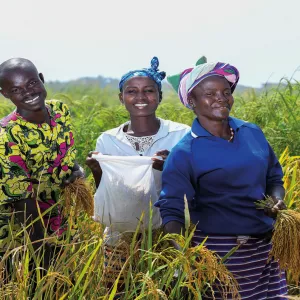How AfricaRice transforms shared tools into impact for rice breeding
By Dr. Baboucarr Manneh, Africa Rice Center (AfricaRice) Director General In the face of urgent challenges threatening global food security — from climate change to new diseases and other adaptation pressures — we need to breed rice for Africa faster than ever. We must predict how varieties will perform earlier, and we now have tools that let us do exactly

How AfricaRice transforms shared tools into impact for rice breeding
By Dr. Baboucarr Manneh, Africa Rice Center (AfricaRice) Director General
In the face of urgent challenges threatening global food security — from climate change to new diseases and other adaptation pressures — we need to breed rice for Africa faster than ever. We must predict how varieties will perform earlier, and we now have tools that let us do exactly that — enabling us to “tap into the future” before it arrives.
This is both our challenge and our opportunity as part of the CGIAR – National Agricultural Research and Extension Systems (NARES) network: how do we access and deploy modern breeding tools, data, and services to transform breeding in West and Central Africa?From ambition to actionFew weeks ago, at AfricaRice headquarters, we welcomed the Governor of Niger State, Nigeria — one of the country’s largest rice producers. Together, we signed an agreement to increase rice production by 10 million tons over the next five years.Such ambition requires high-performing, consumer-preferred rice varieties. And Niger is just one state — others like Jigawa, Kwara, and Kebbi share equally bold goals. In this context, West and Central Africa breeders must be ready to deliver varieties that can be scaled quickly across vast areas.
Making modern breeding tools accessible
CGIAR Breeding for Tomorrow Science Program, through its Breeding Resources (BR) area of work, is focused on providing researchers and breeders with the modern tools and services they need — from genotyping and breeding analytics to digital solutions and operational support.
These services create a stronger, more efficient breeding foundation. A few years ago, achieving two rice generations per year was a milestone; today, with shared genotyping services, we can aim for four generations annually, dramatically accelerating genetic gains. We can also use DNA data to predict performance before field testing — multiplying the size and speed of our breeding pipelines.
A fruitful partnership delivering results
Last year, AfricaRice proudly signed a Host Center Agreement with the BR team at CGIAR. More than a formality, this was an engagement to a shared vision. Modern, data-driven breeding systems cannot thrive without shared breeding and research services, delivered consistently.
This is the reason why regional hubs are being established across the globe, in South Asia and Asia, to harmonise services and tool, and, ultimately, the data that comes from them.
Over the past year, AfricaRice and BR have coordinated genotyping services across multiple CGIAR Centers in West and Central Africa, and with NARES partners in Côte d’Ivoire, Senegal, Ghana, Nigeria, Uganda, and Rwanda — already producing tangible results.
At AfricaRice, a 2020 breeding operations and phenotyping assessment by BR identified priority improvements. Over the past four years, with BR’s operational support, we have invested in irrigation, a seed processing unit, modern machinery (tractors, laser leveller, bund maker, lateral side mower, drones…), and a farm management system. As a result, steady progress has been made across all indicators.
In Ghana, our national partner CSIR–Crops Research Institute (CRI) used these shared services to fast-track new rice varieties resistant to rice yellow mottle virus (RYMV) and blast disease. By screening plants early with DNA tools, breeders could quickly select only those with the desired traits, cutting years from the breeding process. The result: improved versions of popular aromatic varieties were ready in just two and a half years, many already selected by farmers and now in trials for release.
Our next step is to scale these tools and services through a hub-and-spoke model — with AfricaRice hubs extending innovations to local partners.
What sets BR services apart
CGIAR’s global network is a unique asset: services are refined through user feedback worldwide, not in isolation. The network works like a marketplace for breeding innovation — giving partners access to the latest DNA markers and tools from across CGIAR and advanced research institutions, ensuring science is quickly translated into real-world solutions.
Services are also tailored to local realities — adapting to regulations, capacities, and resource levels, while keeping costs, turnaround times, and accuracy relevant. All are accessible via the CGIAR Service Request Portal, a one-stop entry point for the full BR portfolio.
Training is another pillar. AfricaRice and NARES breeders have benefited from courses in data analytics, including use of Bioflow — CGIAR’s breeding analytics pipeline — empowering scientists to manage and interpret data for better, faster decisions.
Way forward: partnering and scaling impact
The strength of shared breeding services lies in our partners — scientists, breeders, and collaborators. Today, seven National Agricultural Research and Extension System partners actively use these services – but Africa has over 50 countries. We must extend this network to ensure more partners can access these valuable resources.
By leveraging AfricaRice’s continental presence and partnerships, we can bring more NARES on board. Together, we are building a stronger, more connected, and more impactful breeding ecosystem —laying the foundation for a more food-secure future in Africa.
Resources:
-
Learn more on CGIAR Breeding for Tomorrow and Breeding Resources
-
Visit the Breeding operations assessment dashboard
Maxwell Darko Asante, Kirpal Agyemang Ofosu, Felix Frimpong, Deladem Kwami Alphonso, Elizabeth Nartey, Agyei Elvis Obeng, Ralph K. Bam, Daniel D. Gamenyah, Priscilla F. Ribeiro, William Manilal, Effectiveness of KASP-SNP markers in selecting for grain quality traits in rice, Plant Gene, Volume 43, 2025, 100503, ISSN 2352-4073.
-
Marker-Assisted Breeding For Resistance To Blast And Rice Yellow Mottle Diseases In Ghana, Ofosu, Kirpal Agyemang, CSIR-CRI Ghana.

